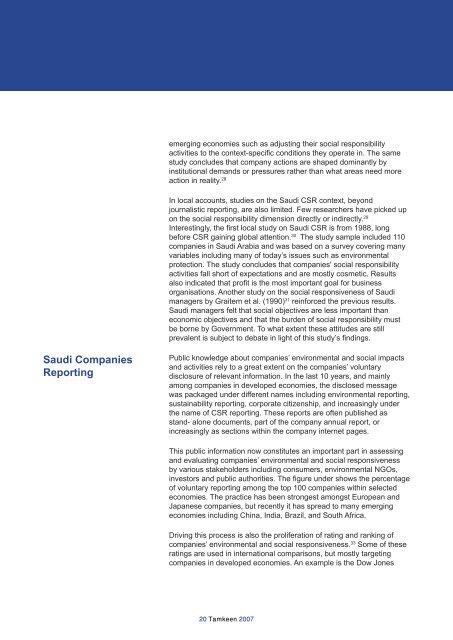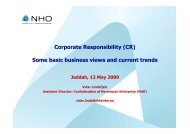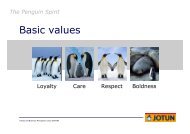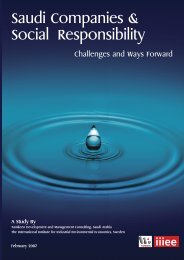foreword - Tamkeen Consult homepage
foreword - Tamkeen Consult homepage
foreword - Tamkeen Consult homepage
Create successful ePaper yourself
Turn your PDF publications into a flip-book with our unique Google optimized e-Paper software.
emerging economies such as adjusting their social responsibility<br />
activities to the context-specific conditions they operate in. The same<br />
study concludes that company actions are shaped dominantly by<br />
institutional demands or pressures rather than what areas need more<br />
action in reality. 28<br />
In local accounts, studies on the Saudi CSR context, beyond<br />
journalistic reporting, are also limited. Few researchers have picked up<br />
on the social responsibility dimension directly or indirectly. 29<br />
Interestingly, the first local study on Saudi CSR is from 1988, long<br />
before CSR gaining global attention. 30 The study sample included 110<br />
companies in Saudi Arabia and was based on a survey covering many<br />
variables including many of today’s issues such as environmental<br />
protection. The study concludes that companies' social responsibility<br />
activities fall short of expectations and are mostly cosmetic. Results<br />
also indicated that profit is the most important goal for business<br />
organisations. Another study on the social responsiveness of Saudi<br />
managers by Graitem et al. (1990) 31 reinforced the previous results.<br />
Saudi managers felt that social objectives are less important than<br />
economic objectives and that the burden of social responsibility must<br />
be borne by Government. To what extent these attitudes are still<br />
prevalent is subject to debate in light of this study’s findings.<br />
Saudi Companies<br />
Reporting<br />
Public knowledge about companies’ environmental and social impacts<br />
and activities rely to a great extent on the companies’ voluntary<br />
disclosure of relevant information. In the last 10 years, and mainly<br />
among companies in developed economies, the disclosed message<br />
was packaged under different names including environmental reporting,<br />
sustainability reporting, corporate citizenship, and increasingly under<br />
the name of CSR reporting. These reports are often published as<br />
stand- alone documents, part of the company annual report, or<br />
increasingly as sections within the company internet pages.<br />
This public information now constitutes an important part in assessing<br />
and evaluating companies’ environmental and social responsiveness<br />
by various stakeholders including consumers, environmental NGOs,<br />
investors and public authorities. The figure under shows the percentage<br />
of voluntary reporting among the top 100 companies within selected<br />
economies. The practice has been strongest amongst European and<br />
Japanese companies, but recently it has spread to many emerging<br />
economies including China, India, Brazil, and South Africa.<br />
Driving this process is also the proliferation of rating and ranking of<br />
companies’ environmental and social responsiveness. 33 Some of these<br />
ratings are used in international comparisons, but mostly targeting<br />
companies in developed economies. An example is the Dow Jones<br />
20 <strong>Tamkeen</strong> 2007









